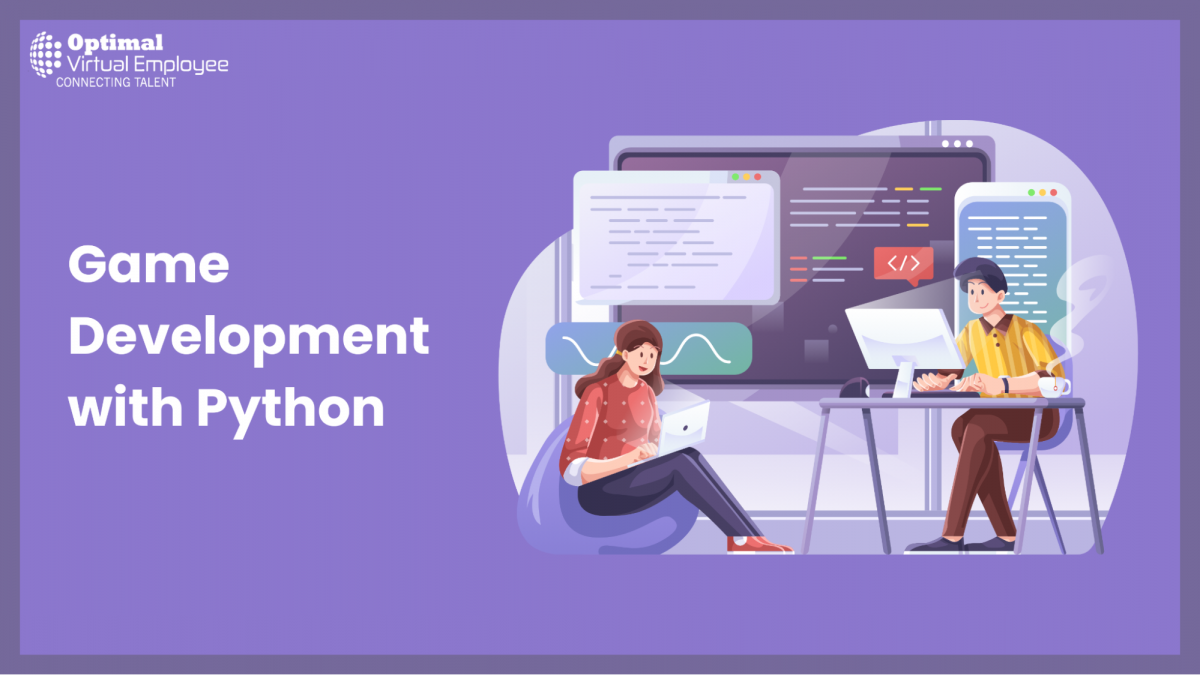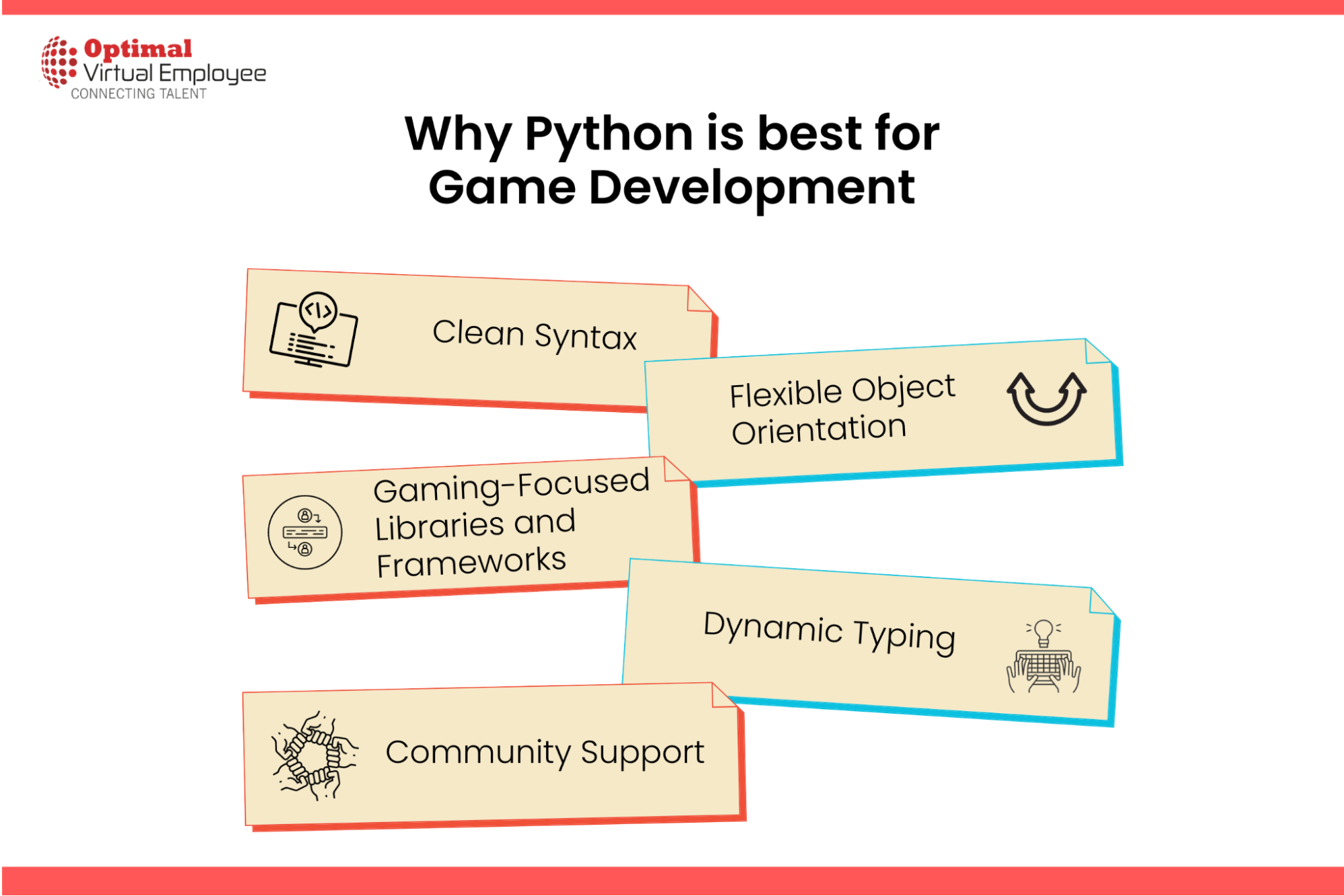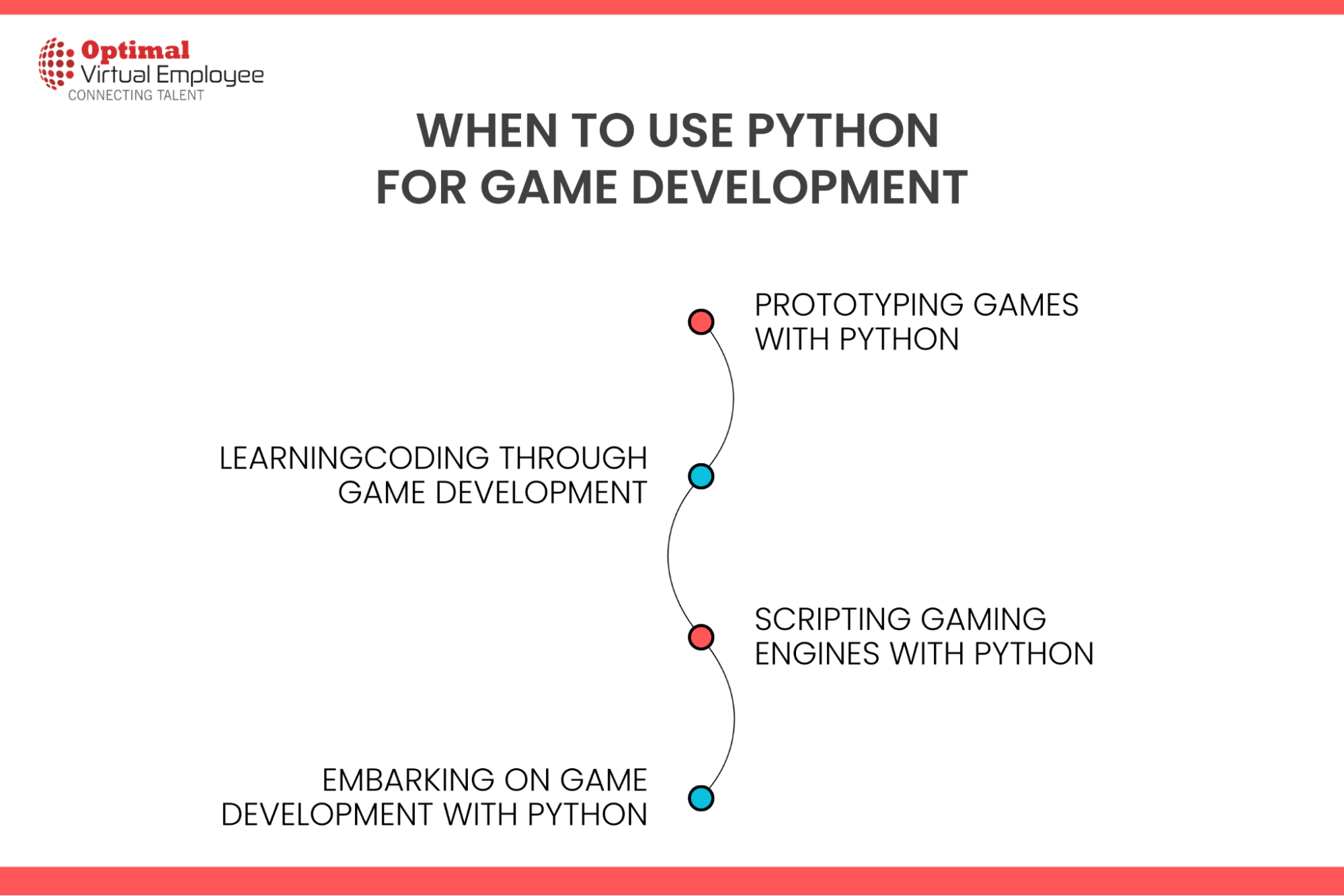Python has emerged as a captivating option for game development within the entertainment industry. Its appeal doesn’t solely stem from its popularity in other tech domains or its open-source nature, although these are undoubtedly strong reasons.
Python finds its place in game development due to its exceptional versatility and robust programming capabilities. This programming language simplifies numerous routine tasks associated with game development, making them quick and effortless to execute. Moreover, there is a wealth of resources available to facilitate effective learning and utilization of Python in this context.
Reasons Python for game development is an ideal choice
Clean Syntax
Python’s popularity is significantly driven by its clean and straightforward syntax. This readability and clarity in code make it a superb option for game development. Not only is the code easy to understand, but it’s also a breeze to write, ultimately saving time and reducing frustration during game development.
The advantage of a clean syntax extends to the seamless implementation of ideas and logic. Debugging becomes less complex, and the ability to incorporate new features effortlessly solidifies Python as an excellent choice for game development.
Flexible Object Orientation
Flexible object orientation operates by attributing characteristics or properties to a class or a specific type of object. These properties are subsequently inherited by any subcategories derived from them. For instance, if a programmer wishes to create an “animal” class, they would initially define standard features like “eat()” and “sleep()”, which would then be accessible to any other object types derived from animals.
Python’s remarkable flexibility in terms of object orientation is one of its standout qualities. This flexibility empowers programmers to create new objects and modify existing ones with minimal code, a valuable capability in game development where the need to create and update objects on the fly is common.
Gaming-Focused Libraries and Frameworks
Python, as a language for game development, offers support for both 2D and 3D graphics, making it a top choice in the world of game programming. It boasts a plethora of libraries and frameworks that simplify game development.
Notable libraries frequently utilized in game development encompass Pygame, Pyglet, Kivy, PySDL2, Pymunk, PyOpenGL, PyODE, and many others. Furthermore, there is an abundance of tutorials available to assist beginners in taking their initial steps in game development.
It’s worth noting that Python has been the foundation for the creation of some world-class games, such as Pirates of the Caribbean Online and Mount & Blade, showcasing its prowess in the gaming industry.
Dynamic Typing
Python boasts a notable advantage over other programming languages in the form of dynamic typing. This means that developers are not obligated to declare variables in advance, resulting in time and hassle savings. Dynamic typing proves particularly beneficial in game development by facilitating swift prototyping and testing.
For instance, if inspiration strikes in the middle of the night, Python allows for immediate experimentation because it doesn’t demand type declarations. Since all data types are dynamically ascertained at runtime, Python programmers are spared the need to cast variables before using them.
Community Support
In the realm of game development, having a supportive community is paramount. Python stands out as one of the largest and most active communities among programming languages. If you encounter a problem, chances are high that someone in this community has already faced and resolved it.
Furthermore, the vast Python community makes it easy to hire developers at an affordable rate. Additionally, this community provides an abundance of open-source tutorials and educational materials. Even if you don’t plan to hire a developer, you can quickly kickstart your project with these resources.
AI Integration Compatibility
Integrating AI into the gaming industry has become increasingly important. Suppose you wish to harness the power of deep learning and other forms of machine learning to enhance your gameplay. In this case, Python has proven to be an excellent tool for AI development. Numerous libraries like TensorFlow, Keras, Theano, and more cater specifically to developers seeking to implement AI features into their games.
Moreover, Python’s multi-platform support allows you to develop your game on one platform and seamlessly deploy it to others. Additionally, Python’s open-source nature contributes to cost reduction.
Robust Performance
Python offers a pervasive and influential feature: importing modules that enable developers to access data from external sources and reuse it in their projects. This modular approach saves space, as each project need not contain all the necessary data; only the essential modules are imported from other sources and merged with the original files.
Python is renowned for its robust performance, ensuring that your game can handle a high level of action without slowing down. This is particularly advantageous for the development of action-based games, as they can process information concurrently without freezing or lagging. A notable example is the immensely popular Nintendo game, Mario Kart 8 Deluxe, which has sold over 45 million copies worldwide, showcasing the programming language’s capabilities.
Inherently Scalable
Moreover, Python excels in scalability. This means that should the need arise to introduce additional features or levels to your game, Python can seamlessly accommodate these changes. This scalability proves advantageous when creating new updates, as Python’s code is easy to comprehend and write. This enables developers to concentrate on their tasks rather than grappling with the intricacies of the language.
For instance, projects that involve continuous feedback from gamers and players may necessitate effortless scalability. As the user base expands, developers must keep up with increasing demand, and Python’s scalability supports this growth.
Furthermore, Python offers significant advantages when large teams collaborate on a single project. It establishes a consistent environment where all members of the development team can work harmoniously, sharing a common codebase for reading and writing code effortlessly.
When to use Python for game development
Notwithstanding these limitations, Python offers a multitude of advantages to game developers.
Prototyping Games with Python
Python’s user-friendly nature makes it an excellent choice for prototyping various programs, including games. Even if your ultimate goal is to develop the final version in a different language for performance reasons, Python delivers a swift turnaround time for experimenting with game logic, testing concepts with your target audience, or presenting ideas to colleagues and stakeholders.
Learning Coding Through Game Development
If you’re using game development as a means to learn how to code, Python serves as an exceptional gateway to grasp the fundamentals and delve into the world of object orientation. Progression is relatively swift, allowing you to test your creations as you advance. Additionally, there’s a wealth of gaming libraries and tutorials catering to various experience levels.
Scripting Gaming Engines with Python
For those aspiring to pursue a career in gaming, the idea that learning Python might be futile should be reconsidered. Python, as a widely adopted open-source scripting language, often finds its place in developing larger games. For example, Unreal Engine supports Python for scripting tasks that streamline manual processes within the editor, such as asset importing or actor placement randomization. Similarly, Unity leverages Python for automating tasks related to scene and sequence assembly, among other functionalities.
Embarking on Game Development with Python
Don’t be deterred by performance concerns when considering Python for game development. If you’re aiming to create a game that doesn’t demand top-tier performance optimization and you’re not utilizing heavyweight gaming engines, Python remains a valid and viable choice. To gauge the potential, examine existing games developed using Python, such as Disney’s Toontown Online, Frets on Fire, The Sims 4, and Eve Online.
Starting Your Game Development Journey with Python
The Python ecosystem offers a diverse range of gaming libraries suitable for individuals ranging from complete beginners to seasoned Python enthusiasts. These include:
– Pygame is a popular option for crafting relatively simple 2D games.
– Pygame Zero, provides a tutorial for transitioning games from Scratch, making it an excellent choice for absolute beginners, including children.
– Pyglet is a robust cross-platform windowing and multimedia library for constructing games and visually immersive applications.
– Panda3D, initially developed by Disney for Toontown Online, and now an open-source framework for creating games and 3D graphics using Python. It operates under the hood with C++, offering the option to develop games in C++.
– Ursina Engine, a framework built on Panda3D that simplifies certain aspects of the library.
– Kivy is a versatile framework for developing Python apps across various platforms, including Android, iOS, and Raspberry Pi. Numerous tutorials are available to guide you in building mobile games with Kivy.
Conclusion
Python has played a pivotal role in the creation of renowned games like Frets on Fire, which leverages the Pygame library. Pygame stands as one of the most widely used libraries for game development in Python, catering to both novice programmers and seasoned professionals.
Additionally, Python has been employed in the development of World of Tanks (WoT), a game characterized by its immediate action gameplay, intense four vs. four team battles, and a rich progression system featuring over 100 exquisitely rendered tanks.
These examples underscore the impressive capabilities of Python in delivering captivating gaming experiences. A Python web development company can harness this potential to create immersive gaming experiences for web users, given Python’s compatibility with Windows, Mac OS X, and Linux.











